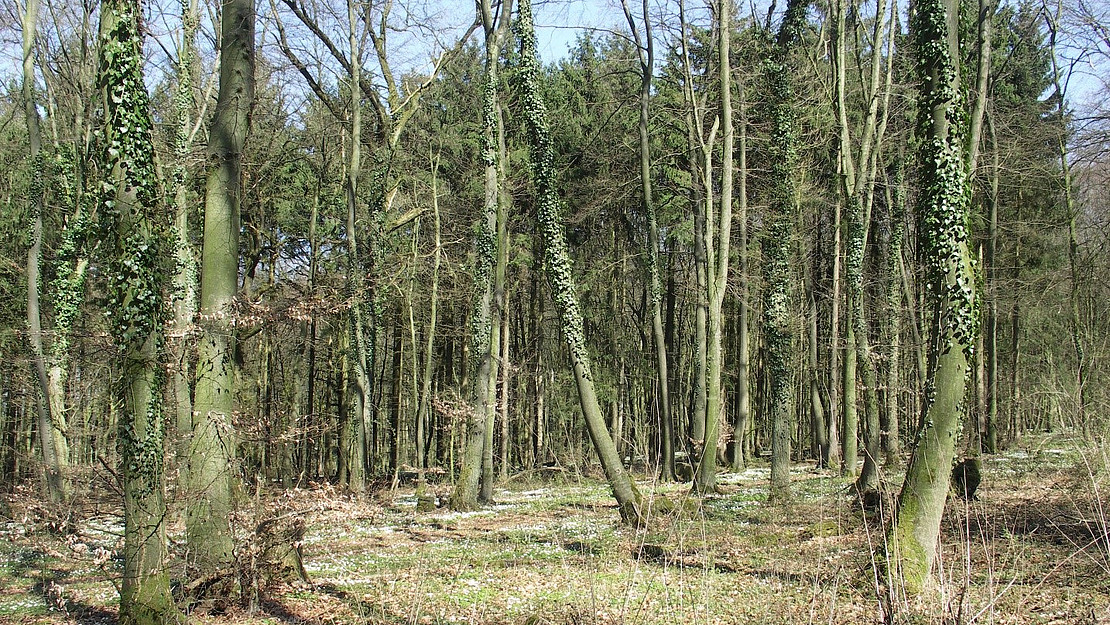This page contains automatically translated content.
Effective nature conservation in the forest needs participation

With "Natura 2000," Europe has the world's largest network of protected areas. In Germany, large parts of it are forest and in the hands of private individuals. A survey conducted by a research team from the Universities of Göttingen and Kassel and the Northwest German Forest Research Institute (NW-FVA) provides insights into the goals, management practices and attitudes of private forest owners with and without Natura 2000 areas in the low mountain region of Lower Saxony.
Natura 2000 has an ambitious objective - to conserve and improve the condition of endangered and typical habitats and species while addressing local social and economic concerns. However, the effectiveness of the conservation network is controversial. Implementation problems at the political and administrative level, doubts about ecological effectiveness, and conflicts with local forest owners were joined in early 2021 by the announcement of a lawsuit by the European Commission: it accuses Germany of inadequate implementation of parts of the required conservation measures.
Perspectives of private forest owners
Within Germany, one focus of the network is on the forest ecosystem. What is the perspective of those who own, manage and maintain this forest? What is their position on Natura 2000 and what impact will any protected area designation have on their actions? With the support of the Weser-Ems and Southern Lower Saxony Chambers of Agriculture, the Osnabrück-Süd Forest Protection Cooperative, and the Southern Hanover and Northeim Forestry Associations, doctoral student Malin Tiebel, together with Prof. Dr. Tobias Plieninger (both Department of Socio-Ecological Interactions in Agricultural Systems, University of Göttingen/Kassel) and with Dr. Andreas Mölder (Department of Forest Nature Conservation, NW-FVA) the perspectives of 1671 private forest owners from the low mountain region of Lower Saxony. With an average forest ownership of 11 ha, divided into three forest parcels, one can speak here of small private forests.
Basically, the objectives of the respondents are manifold: "The preservation of a healthy and stable forest stand, the protection of soil, water and air quality as well as the safeguarding of biodiversity are rated as important or very important by more than 90% of the participants," reports Mölder. This is followed by the preservation of the forest as a cultural asset and as a family heritage. More than two-thirds of the respondents consider wood production for personal use to be important. Contradictions can be seen in the area of nature conservation: although safeguarding biodiversity appears to be very important to a large proportion of forest owners, only 45% of respondents actually state that they actively carry out nature conservation measures.
And what about Natura 2000?
Forest owners with Natura 2000 forest stands rank timber production as more important than those without such stands: they harvest mature individual trees and thinning their stands significantly more often. The only biodiversity-enhancing activity more frequently practiced in Natura 2000 forest stands than in other forest is the preservation of old-growth, woodpecker, or habitat trees. Has more active management led to stands worthy of protection, and thus to under-protection, or have the restrictions it threatens first sparked greater interest in timber harvesting? "This question cannot be answered from the data," Tiebel said. However, he said, the survey shows that Natura 2000 forest owners are much more critical of conservation measures: They feel more threatened in their personal freedom of decision, wish significantly more often for better participation, more often perceive the nature conservation requirements as too strict and the resulting costs more often as high.
Participation desired
"There are ongoing conflicts in the implementation of Natura 2000, both at the local and political level. Also, because action planning for individual Natura 2000 sites is currently underway, it seems more important than ever to involve small private forest owners and their needs more - both now in Natura 2000 implementation and in planning future protected area strategies," argues Plieninger. In many places, successful linking of nature conservation and resource use is only possible together with private forest owners. The diverse interests of forest owners, as well as the fundamental objective of Natura 2000 to also take regional conditions into account, offer promising conditions for this.
The project "Small Private Forests and Biodiversity: Protection through Resource Utilization (KLEIBER)" is funded by the German Federal Ministry of Food and Agriculture (BMEL) through the Agency of Renewable Resources (FNR) within the framework of the funding program "Renewable Resources" and based on a resolution of the German Bundestag (FKZ 22001218 and 22023218).
Further information:
Original publication:Tiebel, M., Mölder, A. & Plieninger, T. (2021). Small-scale private forest owners and the European Natura 2000 conservation network: Perceived ecosystem services, management practices, and nature conservation attitudes. European Journal of Forest Research. Doi: https://doi.org/10.1007/s10342-021-01415-7
In their English-language blog, the Department of Social-Ecological Interactions in Agricultural Systems presents news from their research.
Contact:
Malin Tiebel
PhD student in the Department of Social-Ecological Interactions in Agricultural Systems
Tel: 0551 39 25815
Mail: Malin.tiebel[at]uni-goettingen[dot]de
Prof. Dr. Tobias Plieninger
Head of the Department of Socio-Ecological Interactions in Agricultural Systems
plieninger[at]uni-kassel[dot]de
Dr. Andreas Mölder
Research associate at the Northwest German Forest Research Institute, Department of Forest Nature Conservation
andreas.moelder[at]nw-fva[dot]de